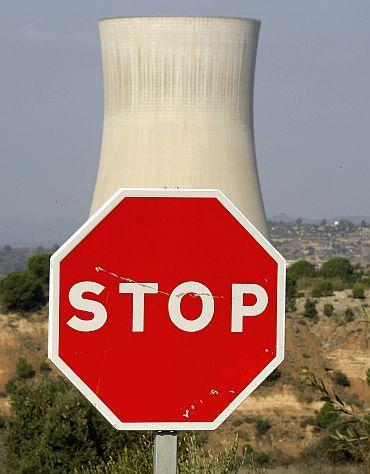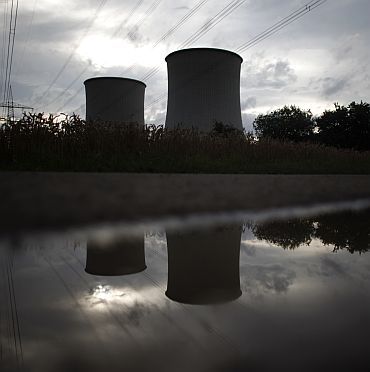Photographs: Reuters Aziz Haniffa in Washington
In a scathing indictment of the nuclear liability bill passed by Indian Parliament, Nicholas Burns, former under secretary of state in the Bush administration, has warned that if the bill was not amended it could sound the death knell of the historic Indo-US nuclear deal and adversely impact on the envisaged US-India strategic partnership.
Burns, who was the key US interlocutor in negotiating the US-India nuclear deal, said: "My view of the civil nuclear accord is that the actions of the Indian Parliament in putting forward the nuclear liability bill is going to stall this agreement unless something is done to modify that action by the Indian parliament."
Burns, co-chair of the report Natural Allies: A Blueprint for the Future of US-India Relations that was officially rolled out Wednesday by the Centre for a New American Security to a packed audience at the Knight Conference Centre/Newseum in Washington, bemoaned that the agreement was yet to be implemented even though 'the two countries agreed on a bilateral phase of this in July 2007 -- more than three years ago.'
Burns said he was extremely "worried that this very high profile centrepiece of the relationship is not going to be fulfilled without some quick action by the Indian government and the Indian Parliament."
...
'Will potential suppliers be satisfied?'
When asked by rediff.com, how this major hiccup on the eve of President Obama's visit to India could be overcome, particularly since the Indian government has made clear the bill cannot be amended, Burns said it is the responsibility of the Indian government to work with its own Parliament to resolve this impediment and lauded the Obama administration for showing "great forbearance."
"Here's the time-line," he said, adding, "We finished the bilateral negotiation on July 22, 2007. We finished the Nuclear Suppliers Group for the international negotiation in October 2008 -- the Bush administration did that. And, now we are in the situation, where this agreement cannot be implemented because of the very ill-advised bill in the Indian Parliament."
Burns acknowledged, "I am out of government, and I will leave it to those in government to resolve this. But I will only say this, the test will be and the concern of the private sector, not just for the United States, but in Russia, in France, and other countries -- potential suppliers of nuclear power plants construction and nuclear fuel for India -- can they be satisfied?
'You have got our telephone number, we hope the phone rings'
"Because the bill as it is currently written sends exceedingly negative signals to the private sector around the world," he added.
Burns said he was aware "that the two governments have the capacity to resolve this, but I respectfully say, it is really a function of the Indian government having to work with its own Parliament on this issue."
He said, "The Obama administration has shown great forbearance obviously, and I would hope this agreement could be brought to operational capacity," and reiterated, the deal "in the view of a lot of people is one of the most significant agreements every undertaken by the two governments. It took three full years, where we both had to move mountains with our parliaments."
The other co-chair of the CNAS report and erstwhile Deputy Secretary of State in the Bush administration, Richard Armitage said, "We, share the sorrow and horror at Bhopal, although we did not suffer it. We understand the feelings."
"But let's be very clear -- we cannot want this agreement more than India and the ball is clearly in India's court, and there's just no question about that."
Armitage quipped, "So, they used to day, 'You have got our telephone number, we hope the phone rings."



article